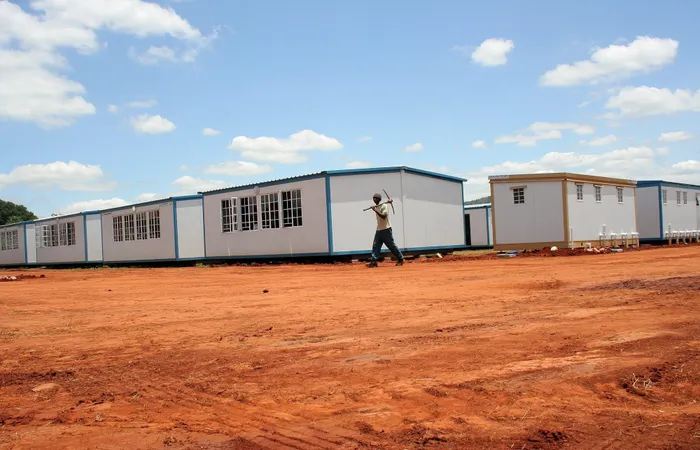WCED criticised for making schools share property to combat placement woes

Tensions have arisen over the WCED’s decision to build a temporary school on the premises of a primary school in Mitchells Plain. FILE
The construction of a temporary school within the grounds of a Mitchells Plain primary school has raised concerns over the Western Cape Education Department’s planning capabilities to accommodate unplaced learners in the province.
Annually, thousands of learners in the province scramble for placement before the academic year begins due to the pressures experienced by the province’s 1 449 schools.
The recent provincial economic review outlook report revealed that over the past nine years the number of schools in the Western Cape declined by 0.3%, while the number of learners increased by 17.5%.
The WCED reverted to building temporary schools, six planned for this year, with some placed within the premises of other schools – an occurrence that has irked a Mitchells Plain community which found out that such a structure would be built to accommodate high school learners.
The province already has four schools that operate on one premises.
According to documents seen by the Weekend Argus, the new Washington Drive High School will accommodate unplaced learners from Philippi, Crossroads and Nyanga areas schools that are full.
The department said the fact there is one high school for every three primary schools compounded the problem of placing high school learners.
The department’s spokesperson, Bronagh Hammond, said R75 million was set aside to build the Washington Drive school, first as a temporary structure to accommodate learners until the permanent school was completed.
Hammond said the school would have 10 mobile classes and would begin operating next year.
“The admission policy of the school is yet to be determined. However, learners that require accommodation in the district for 2023 could be placed at the school. This could include learners living both within and outside the immediate area.”
The vice-chairperson of the Colorado Ratepayers’ Association, Jennifer Daniels, said residents were angry that they had not been consulted.
“How do you build a high school on the premises of a primary school? There are so many safety concerns.
“There are many children in our area who are unplaced yearly, or who have to travel outside of Mitchells Plain because there is no space for them, so why now make a plan for them too? Why have they not consulted us?”
An angry parent, Zuraya du Plessis, whose child has not received placement for next year, said she was disappointed by the department’s inability to manage the yearly problem properly.
“She wasn’t accepted at schools in the area. I can’t afford to put my child in a private school or allow her to travel far to attend school. I am angry, because my child is excited to go to school and this will be a setback for her, but children from other areas will get the opportunity further their education here.”
Community activist Natalie Bent said: “We have just received a letter to say that contractors have been appointed to start with the building of Washington High School without public participation.
“There is a fear that primary school children will be bullied. Then there is also the burden of children of our areas who yearly have to apply out of Mitchells Plain because there’s no space here, thus causing extra expenditure for parents.”
Hammond said they had taken the safety aspect into consideration and will have a fence to separate the schools.
The principal of Solomon Mahlangu Primary School in Kraaifontein, Spiwo Dubulekwele, said Mitchells Plain residents were right to be concerned as his school had been waiting for five years to be removed from the premises of another school.
“We were also told that we would be moved to a permanent school that was being built for us, but we still find ourselves here, waiting, while the conditions of some of the mobile classrooms have become rotten and unbearable to teach in,” he said.
Dubulekwele said their school was supposed to have been completed already but land grabs during the Covid-19 lockdown meant that his 922 learners had nowhere to go.
“I can understand why those people are so upset. Look what happened here – they said it’s temporary, but we are still here.
“It’s an inconvenience to the other school. We have to share grounds, we can’t operate as a normal school and have functions, because we must consider the other school.”
Education activist Hendrick Makaneta said building temporary schools presented an opportunity for the WCED to plan for the upcoming year.
“There is no doubt that inadequate infrastructure affects learning and teaching negatively. The way forward is that the government should prioritise the issue of infrastructure by building more schools in order to avoid the placement backlog which has become a regular occurrence,” he said.
The founder of civic organisation Parents for Equal Education SA, Vanessa le Roux, accused the WCED of deliberately causing tension.
“Their own policy says that a child goes to the nearest school where he stays, while in Mitchells Plain there is a high number of unplaced learners yearly.
“I suggest that the WCED should not do things behind closed doors, especially things that require public participation, otherwise I don’t think it’s a wise idea.”
Related Topics: